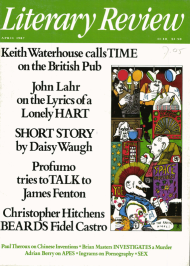Christopher Hitchens
Self-Castrated Beaver
Castro
By Peter Bourne
Macmillan 332pp £14.95
I once saw the bearded one – el barbudo – and was close enough to touch him. It was at a rally in Santa Clara on 26 July 1968. The murder of Che Guevara was a recent, vivid memory. The Vietnam war, horrifying enough at the time, was to get more ghastly yet. In Angola and Nicaragua, partisan groups were still engaged in what seemed an endless and quixotic battle against the Portugese and American empires. Castro spoke proudly against these and other despotisms. But he also denounced the Soviet Union and its dismal block of coerced allies. He had seized the person of Anibal Escalante, chief Stalinist of Cuba, and arraigned him and his 'microfaction' for trial. Escalante, who had been semi-exiled as ambassador to Prague, found himself behind bars fo r his intrigues with Moscow. Was it possible that Cuba was keeping its promise, of equidistance between the superpowers and revolutionary internationalism a Ia Bolivar or Marti?
Almost exactly a month later, l watched the bearded one give yet another very long speech. Czechoslovakia, late home of Escalante, had been invaded. Cuba's place in the time zone meant that we received the news very early in the morning. It was announced that Fidel would address the masses late that night. In the meantime, the organs of propaganda held to the careful neutrality they had observed between Brezhnev and Dubcek in the unfolding of the crisis. I thus had the unusual and perhaps unique experience of spending a whole day in a Communist state, with only one topic of conversation and no stated party line. Cuban public opinion was unmistakably pro-Czech, and not merely because of the natural sympathy for the small nation. There was no wild applause when the embodiment of the revolution took the stand to announce, in a dull, dogmatic and feebly-argued speech that the Warsaw Pact forces were right. From that day to this there has been no significant, public division between Moscow and Havana. Cultural life in Cuba has also adapted itself to the shape that such an unanimity might suggest.
It was not ever thus. 'He was almost Christ-like during this first simple pilgrimage in his love and concern for the people. He was drunk with triumph but glowingly so.' These simple words from the pen of Edwin Tetlow, correspondent of the Daily Telegraph , were a fair sample of

Sign Up to our newsletter
Receive free articles, highlights from the archive, news, details of prizes, and much more.@Lit_Review
Follow Literary Review on Twitter
Twitter Feed
It wasn’t until 1825 that Pepys’s diary became available for the first time. How it was eventually decrypted and published is a story of subterfuge and duplicity.
Kate Loveman tells the tale.
Kate Loveman - Publishing Pepys
Kate Loveman: Publishing Pepys
literaryreview.co.uk
Arthur Christopher Benson was a pillar of the Edwardian establishment. He was supremely well connected. As his newly published diaries reveal, he was also riotously indiscreet.
Piers Brendon compares Benson’s journals to others from the 20th century.
Piers Brendon - Land of Dopes & Tories
Piers Brendon: Land of Dopes & Tories - The Benson Diaries: Selections from the Diary of Arthur Christopher Benson by Eamon Duffy & Ronald Hyam (edd)
literaryreview.co.uk
Of the siblings Gwen and Augustus John, it is Augustus who has commanded most attention from collectors and connoisseurs.
Was he really the finer artist, asks Tanya Harrod, or is it time Gwen emerged from her brother’s shadow?
Tanya Harrod - Cut from the Same Canvas
Tanya Harrod: Cut from the Same Canvas - Artists, Siblings, Visionaries: The Lives and Loves of Gwen and Augustus John by Judith Mackrell
literaryreview.co.uk